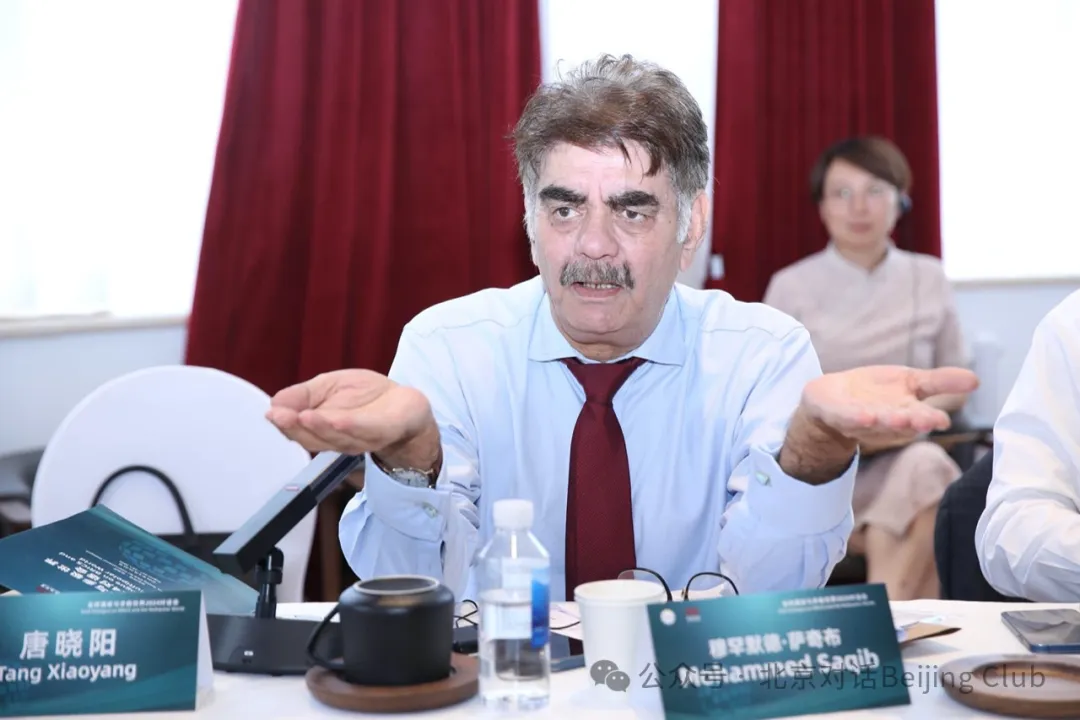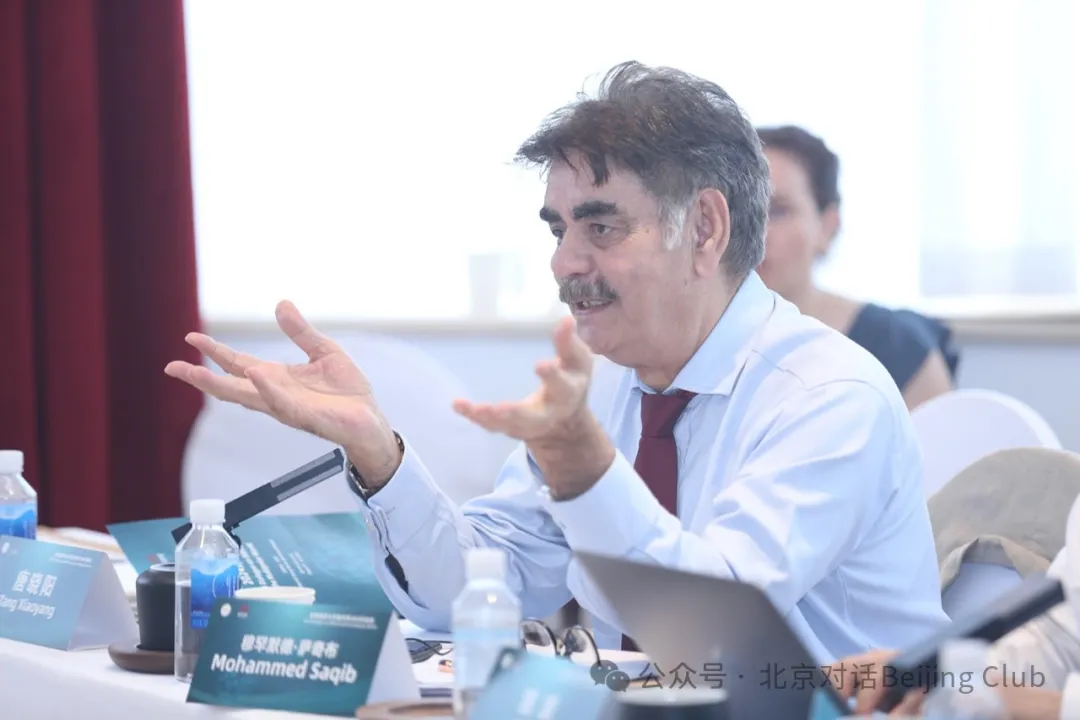发布时间:2024-10-09 作者: 穆罕默德·萨奇布
印度中国经济文化促进会秘书长穆罕默德·萨奇布在发言中指出,金砖国家虽然在构建新型多边机制方面取得了一定成就,但也存在一些问题,主要问题在于缺乏政治意愿、缺乏明确的合作重点和有效的解决机制。
本文转自10月7日观察者网。
2024年8月24日至25日,由中国公共外交协会指导、北京对话主办的“金砖国家与多极世界2024对话会”在北京举行。来自15个国家和南方中心等国际组织的近40位专家学者,就金砖国家构建货币体系、参与多极世界构建、增强经济韧性与合作等议题,进行了深入研讨。
印度中国经济文化促进会秘书长穆罕默德·萨奇布在发言中指出,金砖国家虽然在构建新型多边机制方面取得了一定成就,但也存在一些问题,主要问题在于缺乏政治意愿、缺乏明确的合作重点和有效的解决机制。解决方案是中国作为领导者,促进成员国之间更多的互动与合作。中国和印度的互补与合作将推动金砖国家乃至全球南方的发展。以下为萨奇布发言实录。

穆罕默德·萨奇布在“金砖国家与多极世界2024对话会”上发言北京对话
穆罕默德·萨奇布:
目前的情况是,金砖国家确实在运作,但实际上并没有取得太多成就,除了建立新开发银行。金砖国家并没有实现他们能力范围内能做到的事情,所以,到目前为止,金砖国家的表现并不理想。我们都知道问题所在。
对于印度来说,问题和解决方案没有契合,其中存在脱节。中国和印度是金砖国家中前两大成员国,这也可能是金砖国家面临的另一个最大问题。因为中国太大了,相比之下,印度只有中国的五分之一。印度有很大的野心,而中国则显得过于谨慎。这些因素的结合导致我们没有真正地解决问题。而在这一切背后缺乏的是政治意愿。正如刚才讨论的,金砖国家存在的意义是什么?
我认为,问题并不在于我们五个国家走到一起创建某种经济模式。我觉得,最初的设想是这五个来自不同大陆的大国能够成为吸引其他发展中国家凝聚在一起的磁石。比如说,南非代表非洲,印度代表南亚,中国代表东亚,巴西代表中美洲。这五个大国应该成为吸引其他发展中国家的磁石。
最终,我们希望能够形成一个全球南方的联盟,但这一愿景目前并未实现。其中最主要的原因是缺乏政治意愿。以印度为例,人们将这个平台以及外交政策用作国内政治的工具,实际上没有让它发挥作用。
印度的外交政策就像一个逃婚的新娘,我们在跟一些国家“同床共枕”,又跟另一些国家“约会”,同时又和其他国家“许下诺言”。我们自己也不清楚在做什么。这就是问题所在,我们真的不知道自己在做什么。我们想吸引其他发展中国家,特别是从全球南方吸引国家加入,但我们无从下手,所以,印度显得很迷茫。
中国则有些过于谨慎。我在从事全球南方工作的过程中和许多发展中国家交流,我发现很多国家期望中国担任领导角色,但中国不愿意成为领导者。而印度则渴望成为领导者,但人们不愿意让印度领导。这就是问题的症结之一。我们可能需要跨出金砖国家的框架。
第二个问题是缺乏明确的重点。每次金砖国家会议都会有一个既定议程,但新加入的国家会再添加两项内容,接着另一个国家又会再添加两项,结果就是我们有一长串要处理的事项,但最终什么也没有落实。我建议应该有一些明确的重点领域和对应的负责国家,例如教育和技能发展。印度有庞大且受过良好教育的人口,80%的人口会说英语,所以我们在这一领域具备优势。
例如,如果金砖国家发起一个技能和教育倡议,印度可以在其中担当领导者。因为技术培训等方面的优势,俄罗斯可以成为共同领导者。在每一个领域,我们可以指定一个领导国家和一个共同领导国家,然后在年底,他们需要展示他们的成果。比如,在金砖国家的教育和发展方面,印度和俄罗斯应该负责领导。
同样地,巴西可以提出金砖国家的农业和食品安全倡议,而南非则可以因其环境保护专长也成为这一领域的(共同)领导者。再例如,俄罗斯可以在教育领域与印度共同领导,但在全球南方的能源安全方面,俄罗斯应该是领导者。
因此,类似地,对于五个金砖国家及“金砖+”的十一国,我们应该明确何种类型的合作伙伴组合,包括主要领导者、共同领导者,以及他们需要展示的某种形式的成果然而现实是金砖国家并没有做到这一点,它没有给大家展现出应有的成效。
此外,我们必须有一些解决机制。我们必须引入私人企业的参与。如果我们真的想在金砖国家取得成就,私营企业家将起到非常重要的作用。我所说的是来自金砖国家的私人企业家,我认为类似北京对话的平台,可以发挥至关重要的作用。比如说,你们可以从金砖国家中挑选十位顶级企业家,组成一个金砖国家精英俱乐部。俱乐部会有自己的议程,了解问题所在,可以向政府提供建议并采取行动。这会对解决问题有很大的帮助。我们必须设定一些可以实现的目标,并且要持续追踪这些目标的进展,当然这可以不用是官方形式,而是非官方的。
我们需要更多的互动、合作与协作,但在金砖国家内部,我们其实已经具备了所有解决方案。今天早上,翟东升老师提到了外汇支付的问题,而我现在谈的是贸易问题。如果我们允许货币互换,那么金砖国家之间86%的贸易逆差可以在全球南方内部解决。我们不必依赖 SWIFT 或其他系统。这就是现实。
我们正处在一个新的世界经济秩序的边缘。如今,金砖国家和其他发展中国家充满了各种想法、创新能力和潜力。我们需要的是一个领头羊,这可以是中国,但目前尚未实现。
比如说,由于人口老龄化,中国正在失去人口红利,但印度却是全球最年轻的国家,拥有大量受过教育的英语人才,拥有许多工程师和科学家。印度和中国可以形成非常好的互补关系。中国是全球的制造业中心,印度在服务业方面表现出色。如果可以,中国的硬件和印度的软件相结合,不仅可以推动金砖国家的前进,还可以带动整个全球南方的发展。
我理解各国领导层和体制不同,我可能并不完全了解中国的情况,但我感觉中国似乎过于谨慎。它似乎对未知感到恐惧。它的对手就近在咫尺,正在影响其他国家,因此吸引更多国家加入对中国来说百利而无一害。美国在南海的频繁行动随时可能带来冲突。中国需要更多的盟友和朋友。中国有能力、资源和善意来做到这一点,但它似乎仍在非常缓慢且谨慎地行动。
如果中美之间发生冲突,受害的不仅仅是中国,而是整个全球南方,特别是“一带一路”倡议中的国家。我认为人们还没有充分意识到“一带一路”对其他发展中国家的投资贡献,以及与中国结盟带来的信心。
人们现在看到了西方体系的替代方案。我认为中国做的事情已经比布雷顿森林体系更多,规模也更大。所以,为什么我们还需要世界银行和IMF的批准?我认为中国应该再往前迈出一步,这是目前的唯一解决方案。这不仅是为了中国,也是为了所有发展中国家。

穆罕默德·萨奇布在“金砖国家与多极世界2024对话会”上发言北京对话
以下为英文原文:
It has been the case that BRICS is working, but it has not really achieved much beyond establishing the New Development Bank. It’s an achievement, but they are not really fulfilling the kind of things they can do. So probably BRICS is underperforming so far. We all know the problems and since morning, I have heard that we all have the solutions. But somehow in India’s case, problems and solutions are not getting together. There is a miss. India and China are the largest members of BRICS, this is probably the other biggest problem for the BRICS. Because China is too big. India, by comparison, is only one-fifth of China. India has big ambitions. China is a bit too cautious. So all these things coming together is not really solving the problem. Behind all this is political will. The political will is not happening. Like he mentioned, what is the purpose of BRICS?
I think Mr. Mi that it is not about that we five countries come together and generate a kind of economic model.Rather, I believe the idea was that these five large countries from different continents would serve as a magnet for developing countries to collaborate and work together. For example, South Africa for Africa, India for South Asia, China for Southeast Asia, and Brazil for Central America. That will make these five big countries to create sort of a magnet for other developing countries.
At the end of the day, we will have a conglomerate ofGlobal South or combination of Global South, but this did not happen. It's because there was no political will. People are using this as bridge, I can say from India that people are using these kind of groupings for the domestic political use, which is not really letting it go. For example, our Indian foreign policy has been used for the domestic political use.
As of today, India’s foreign policy is like a runaway bride. We are sleeping with somebody, dating with somebody, committing with somebody. We don't know what we are doing. So this is a problem that we do not really know. If we want to attract other developing countries which we want to bring in from the Global South, we just cannot do it. India is confused. China is a bit too cautious. A lot of developing countries, when I go and talk to them during my Global South work, people are looking up to China for the leadership, but China is not willing to be (a) leader. India is looking for the leadership, but people are not willing to make India leader. So this is the reason. Probably we will have to go beyond BRICS.
Number two, there is no focus. Every BRICS meeting in a country, you already have an agenda, then new country will add two more items in the agenda. The third country will add two more. So we have a huge list of items to be dealt in BRICS and we end up doing nothing. What I will rather suggestedis that there has to be some focused areas and some focused countries, for example, education and skill development. India has a huge population, the educated population, the 80% speaks English, so they are pretty much doing it.
For example, if BRICS have a skill and education initiative, India can be the leader in it. And because of the technical training and all the things, Russia can be co-leader in it. In every sphere of this thing, we have one leader from these countries, and we have a co-leader.There is a combination at the end of the year when they have to show something, show what they have achieved. For example, for BRICS education and development, it has to be India and Russia. Similarly for Brazil, it should be BRICS agriculture and food security initiative with Brazil and it should be led by South Africa because South Africa has the environmental protection, and then there's a leader in the Global South. For example, for Russia, Russia will be a kind of a co-host or co-leader in education with India, but it will be leader in energy security for the Global South.
So similarly, for all the five countries and plus eleven countries, we have worked out a table of what kind we should be the combination of the partners, a main leader, a co-leader, and some kind of performance they will have to show. That is not happening, and BRICS is not performing.
Another thing is that there has to be some kind of settlement. And you have to have private people. They are going to play a very important role if we really want to achieve something in BRICS. What I’m saying is private entrepreneurs fromGlobal South and I think this Beijing forum can play a very, very important role. You pick ten top businessmen from all the BRICS countries and have an elite club, like Beijing club now, an elite BRICS club. They have their own agenda, they know the issues, they can advise government and they can act on it. This will solve the problem. So there has to be some kind of targets. There has to be achievable targets and then some accountability at the end of the day, not officially, but unofficially.
And there needs to be more interaction, cooperation, and collaboration, but within BRICS, we have all the solutions. So in the morning, Mr. Di told us about the foreign payment issues. I'm talking about the trade issues. If we allow swapping of currency, then 86 % of the trade deficit among each other can be sorted out within Global South. We don't need to go to any either SWIFT or any other system. This is what it is.
I just want to reiterate the point which MadamLi Ming made. We are on the verge of a new world economic order. And most of the countries now in BRICS and other developing countries are brimming with lot of ideas, lot of innovation, capabilities and capacities and lots. What they need is a trigger and the trigger can be given by China, which is not happening.
For example, China is losing the demographic dividends because of their age of population, but India which is the youngest country in the world is there, with huge educated, English-speaking population, with a lot of engineers and scientists, whatever their work is. There can be a very good combination for India and China. You are a manufacturing hub of the world. India is pretty good in services. Probably the combination of hardware and software between India and China. We can not only carry the BRICS forward, but we can carry the whole Global South forward if you want to.
The thing is that I know our leadership and working system, but I do not know aboutChina, but somehow we get this feeling that China is being, I don't know the reasons, over cautious. It's still going to the fear of unknown. While you are seeing that your enemy is right next door, getting other countries is in your interest. America is doing the South China Sea. They are just hanging around you. And they can strike any time. You have to have more people, more friends with you. You have capability and capacity and goodwill to do it. But still we feel that China is moving very slow and it is very cautious.
And if something happens between China and U.S., I think it will not be China which is suffering, but the wholeGlobal South, the whole BRI. You probably do not realize how much contribution BRI has to other developing countries for the investment, how much psychological confidence you get from other developing countries when you are with China.
So people see that now we have an alternative to the Western system. I think China has done much more than the Bretton institutes will do, much more and bigger than that. So why do we need a World Bank, IMF approvals and all those things? I think China should take a step forward. And that is the only solution right now. This will not be for China, but this will be for the other developing countries.
(欢迎关注人大重阳新浪微博:@人大重阳 ;微信公众号:rdcy2013)